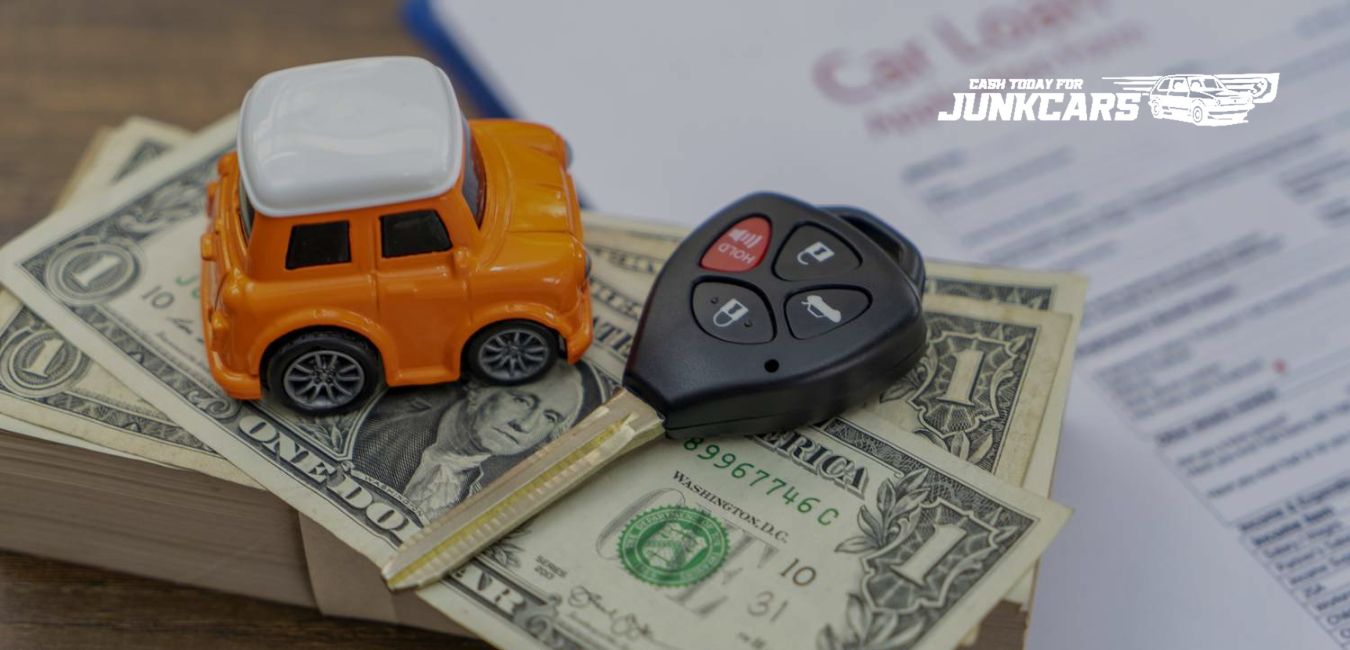Are you stuck with a car title loan and wondering if can I junk a car with a title loan? You’ve come to the right place!
This easy-to-understand guide will explore the ins and outs of junking a car with an active title loan.
No need for confusing jargon or complicated explanations; we’ll break it down in simple terms, perfect for anyone.
So, keep reading if you’re curious about what to do with that title loan hanging over your head and that old car taking up space in your driveway.
We’ll provide clear answers and practical advice to help you decide about your title loan and car. Let’s get started on this straightforward journey together!
Contents
Title Loan Basics
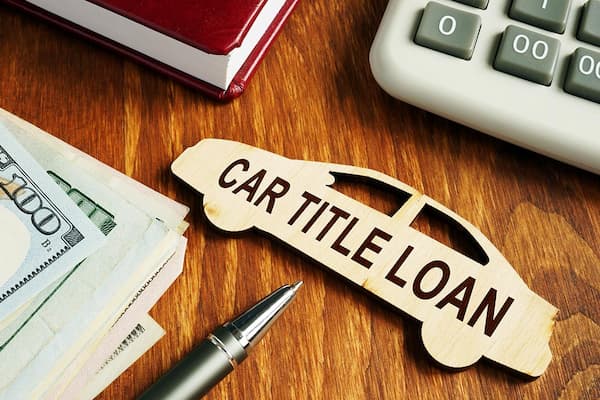
A title loan is a short-term loan that uses your car’s title as collateral. Understanding the terms and conditions and repayment responsibilities is essential before taking out such a loan.
What Is A Title Loan?
A title loan is where you use your vehicle’s title as collateral to secure the loan. It’s a simple concept – you provide your car’s title to a lender, and they give you cash in return.
This cash is handy when you need quick money for emergencies or unexpected expenses. But it’s important to remember that you’re essentially putting your car on the line by taking a title loan.
Terms And Conditions
Title loans come with specific terms and conditions you must understand before getting one. These terms typically include the loan amount, interest rate, and repayment period.
Interest rates for title loans can be quite high, so reading and comprehending these terms is crucial. The loan period is usually short, often 30 days, but it can vary by state and lender.
Ownership Implications
When you get a title loan, you still technically own your car, but the lender has a lien on it. This means the lender has a legal claim on your vehicle until you repay the loan in full.
You can continue driving your car during the loan period, but when you can’t repay the loan as agreed upon, the lender can take possession of your vehicle through repossession.
So, while you still own the car, your ownership is at risk if you don’t meet your repayment responsibilities.
Repayment Responsibilities
One of the most crucial aspects of a title loan is your responsibility to repay it. Title loans often have high interest rates and can be expensive.
You must ensure you can meet your repayment obligations to avoid potential issues. Failure to do so can lead to financial trouble and the risk of losing your car through repossession.
Junking Process

Junking a car is a straightforward process. Here’s the detail –
Definition Of Junking
Junking a car refers to selling your old, damaged, or non-functional car to a salvage yard or a junkyard.
These places typically dismantle the car to salvage usable parts or recycle the metal. It’s a way to get value from a vehicle that’s no longer practical or too costly to repair.
Valuing Your Car
Several factors are considered to determine the value of your junk car. This includes the car’s make, model, year, overall condition, and parts in working order.
Even when a car doesn’t run, it still has valuable parts. The metal body of the car also has scrap value.
You can research online, consult blue books, or ask a professional to get a rough estimate of your car’s worth.
Junkyard Requirements
Each junkyard has its own set of requirements for accepting a car. Common requirements include proving that you own the car.
This ensures the vehicle is free of major non-metal debris and sometimes the car’s ability to be driven to the location. It’s a good idea to call ahead and check what the specific junkyard needs.
Documentation Needed
When junking a car, you typically need to provide certain documents. The most important is the car title, which proves ownership. Without the title, it is challenging to junk the car.
You’ll also need a valid form of identification (like a driver’s license). In some cases, the registration of the vehicle also is required.
Depending on local regulations and the junkyard’s policies, you must complete additional paperwork, such as a bill of sale or a release of liability, to formally transfer vehicle ownership.
Legal Considerations
Before you consider junking a car with a title loan, it’s crucial to understand the legal implications.
Title Loan Liens
When you take out a title loan, you give the lender a lien on your car’s title. This lien gives the lender the legal right to repossess the vehicle if you default.
When you junk the car without satisfying the lien, you essentially deprive the lender of their collateral, which can have serious legal consequences.
State Law Variances
Laws governing car disposal vary from state to state. Some states require a title to be free and clear of any liens before it is junked.
Others allow junkyards to accept vehicles with liens, but the junkyard must then notify the lienholder and potentially hold the proceeds from the sale to satisfy the debt. Researching your state’s specific laws is crucial to avoid legal trouble.
Lienholder Permissions
The safest and most responsible way to junk a car with a title loan is to get permission from the lienholder.
This typically involves contacting the lender and explaining your situation. The lender will be willing to work with you by:
- Releasing the lien: When you’ve paid off the loan or made substantial payments, the lender releases the lien, allowing you to junk the car freely.
- Authorizing the sale: The lender agrees to let you junk the car as long as the proceeds are used to pay off the remaining loan balance.
- Arranging the repossession: Sometimes, the lender prefers to repossess the car and sell it themselves to recoup their losses.
Consequences Of Default
When you junk a car with a title loan without the lienholder’s permission or satisfying the debt, you will face serious consequences, including:
- Civil lawsuit: The lender can sue you for the unpaid loan balance and potentially recover damages.
- Criminal charges: In some states, illegally disposing of a car with a lien is considered a crime.
- Negative credit impact: Defaulting on your loan and potentially facing legal action can severely damage your credit score.
Options With Title Loans
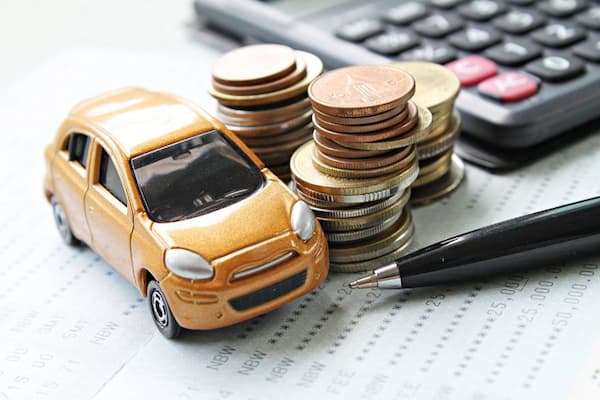
Explore your options before jumping to junking your car with a title loan. Each path presents advantages and disadvantages.
Repayment Before Junking
One straightforward approach is to repay the loan before you decide to junk the car. Here’s how it works:
- Calculate the Total Amount: Find out how much you still owe on the loan, including any interest.
- Arrange the Funds: You must get the money to pay off the loan. This comes from your savings, or you need to find another source of funds.
- Pay Off the Loan: Pay it to the lender once you have the money. This clears your debt.
- Get the Title Cleared: The lender will release the lien on your car’s title after repayment. You now have the free and clear title to your car.
- Proceed to Junk the Car: With the title in your hand, you can now legally junk the car.
Negotiating With Lender
Consider negotiating with your lender if paying off the loan isn’t feasible. Here’s what that involves:
- Contact the Lender: Reach out to your lender and explain your situation.
- Discuss Your Circumstances: Be honest about why you want to junk the car and your financial situation.
- Propose Solutions: You could ask for a reduced payoff amount or more time to pay.
- Agree on New Terms: When the lender agrees, they’ll provide new loan terms. Make sure you understand and agree to these new terms.
Seeking Legal Advice
Sometimes, the best step is to consult a legal expert. This is especially true if you’re unsure about your rights or the best way to proceed. A lawyer can:
- Review Your Loan Agreement: They’ll look at your contract to see what you agreed to.
- Advise on Legal Options: They suggest ways to handle the loan you hadn’t considered.
- Negotiate on Your Behalf: Sometimes, having a lawyer talk to your lender can lead to better terms.
- Ensure Legal Compliance: They’ll ensure your steps are within the law.
Refinancing Options
Refinancing is another avenue. This means replacing your current loan with a new one, hopefully under better terms. Here’s what this involves:
- Find a New Lender: Look for lenders who offer better interest rates or more favorable repayment terms.
- Apply for a New Loan: You’ll need to go through a credit check and provide details about your financial situation.
- Use the New Loan to Pay Off the Old One: When approved, the new loan pays off your title loan.
- Repay the New Loan: You now have a new repayment schedule, hopefully one that’s more manageable.
Alternatives To Junking Your Car
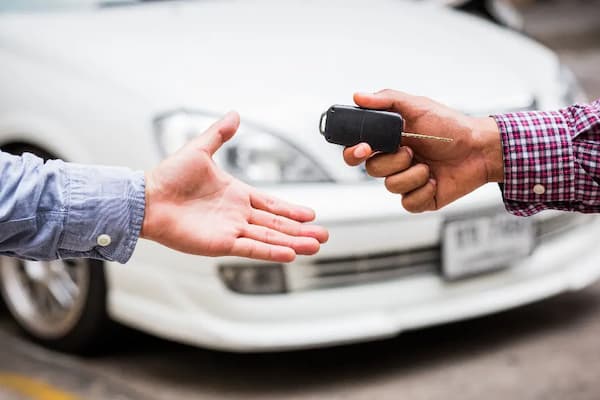
Junking a car with an outstanding title loan isn’t the only avenue available. Here’s a deeper look at 4 alternative strategies:
Selling With A Lien
The presence of a lien indicates an outstanding debt against the vehicle. While selling a car under a lien is complex, it is feasible. Transparency with potential buyers regarding the lien is imperative.
The sale proceeds must first be allocated to settling the loan balance. The seller is responsible for the shortfall if the sale price insufficiently covers the loan. Conversely, any surplus after loan repayment becomes the seller’s equity.
Trading In Your Car
Vehicle trade-ins at dealerships offer a convenient transition from an old car to a new one. The trade-in value assigned to the old vehicle is used as a credit against the purchase price of a new car.
This method effectively reduces the financial burden of acquiring a new vehicle. It can efficiently manage an existing title loan by rolling the balance into the new financing agreement.
Donating For Tax Credit
Donating a car to a qualified charity can yield tax benefits. The IRS allows the donor to claim a tax deduction based on the vehicle’s fair market value.
This option provides a philanthropic avenue and a potential tax advantage. However, ensuring compliance with IRS guidelines and proper documentation is crucial.
Repair And Keep
Assessing the cost-effectiveness of repairing and retaining the car is another viable option. This involves thoroughly analyzing repair costs versus the vehicle’s current value and potential longevity post-repair.
This option can prove economically advantageous in scenarios where repair costs are justified by extending the vehicle’s useful life.
FAQs
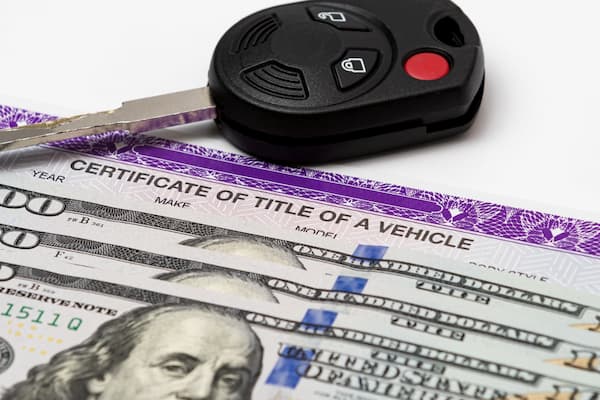
1. Can Title Loan Lenders Prevent Car Junking?
Yes, title loan lenders can prevent car junking. When you have a title loan, the lender owns part of your car until you repay the loan. You need to pay off the loan first.
Then, you can choose to junk your car. Always ask your loan company for advice.
2. How Does A Title Loan Affect Car Value?
A title loan affects your car’s value because the loan company holds part of its ownership. When you get a loan using your car as security, the lender has rights to it until you repay it.
This can lower the car’s value to buyers and dealers.
3. Are There Penalties For Junking A Loaned Car?
Yes, there are penalties for junking a loaned car. When you junk a car you still owe money on, you must pay extra fees. The loan company can ask for the full loan amount right away.
Always pay off your loan first before junking your car.
Can I Junk A Car With A Title Loan: Conclusion
Junking a car with a title loan is tricky. Usually, you can’t junk a car if you still owe money on a title loan.
The loan company has the title as security. This means they own part of the car until you repay the loan.
You must first pay off the loan when you want to junk the car. Once you do that, the title is yours.
Then, you can decide to junk the car. Remember, always check with your loan company first. They can tell you what you can do.


